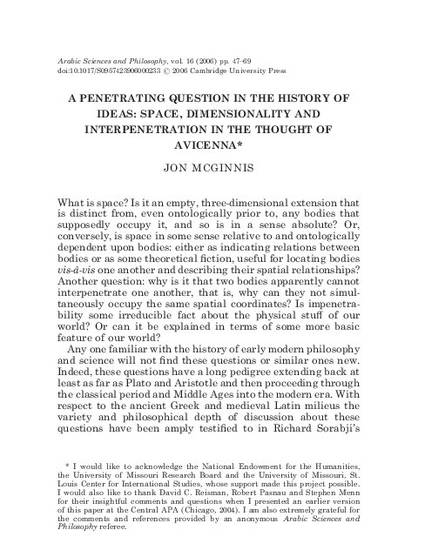
Article
A penetrating question in the history of ideas: Space, dimensionality and interpenetration in the thought of avicenna
Arabic Sciences and Philosophy
(2006)
Abstract
Avicenna's discussion of space is found in his comments on Aristotle's account of place. Aristotle identified four candidates for place: a body's matter, form, the occupied space, or the limits of the containing body, and opted for the last. Neoplatonic commentators argued contra Aristotle that a thing's place is the space it occupied. Space for these Neoplatonists is something possessing dimensions and distinct from any body that occupies it, even if never devoid of body. Avicenna argues that this Neoplatonic notion of space is untenable on the basis of three arguments. In general he maintains that bodies' impenetrability is explained by reference to dimensionality. Consequently, if it is dimensionality that explains impenetrability, and yet as the Neoplatonists hold space inherently possesses dimensions, material bodies could never interpenetrate space and so occupy it and thus bodies could never have a place. The conclusion is patently false. In additions Avicenna argues that the method used to arrive at the possibility of space is illicit, and so Neoplatonist cannot show that space is even possible. Thus, concludes Avicenna, Aristotle's initial account must be correct. The paper outlines the historical context of this debate and then treats Avicenna's arguments against space in detail.
Disciplines
Publication Date
March, 2006
DOI
http://dx.doi.org/10.1017/S0957423906000233
Citation Information
Jon McGinnis. "A penetrating question in the history of ideas: Space, dimensionality and interpenetration in the thought of avicenna" Arabic Sciences and Philosophy Vol. 16 Iss. 1 (2006) p. 47 - 69 ISSN: 1474-0524 Available at: http://works.bepress.com/jon-mcginnis/5/
